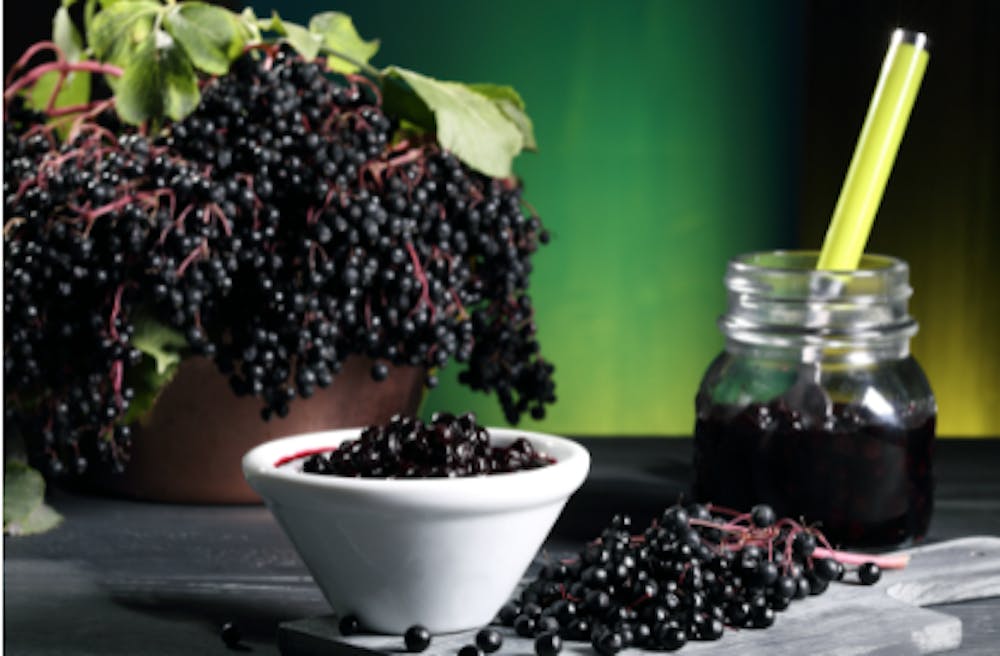The small, dark fruit known as black elderberry has been around for thousands of years, cultivated as early as 2000 B.C. and used for its medicinal attributes since before “The Father of Medicine” Hippocrates, proclaimed it a staple in treating various ailments. Of course, in our more modern times, we may not have an elderberry tree in our back yard but we chew elderberry gummies to help keep our immune system functioning optimally, but what else do you know about it? The black elderberry fruit has an interesting history and plenty of uses, so let's dive into everything you need to know about black elderberry.
Plant Details
The black elderberry plant is also known by its scientific name Sambucus nigra, and has been used by many different cultures around the world for millennia. It can grow in various conditions as long as it can get large amounts of sunlight and soil that allows for easy drainage which make it a commonly grown plant in places all across North America and Europe. The plant itself is a shrub with large, flat leaves and small white flowers that attract butterflies when in bloom, then transforming into the black elderberry we see pictured on the front of our elderberry gummies bottle. While the elderberry leaves can give off an unpleasant scent when crushed, the fruit itself tastes like a blend of blue berries and black berries with some earthiness and a tart finish.
Common Uses
Some of the common uses of the black elderberry throughout history have been as syrups, dyes, wines, jams, and even lotions; all while hinting at health benefits or the delicious taste of the berry itself. The large abundance of elderberries means that they can be harvested in large quantities and transformed into various well-being products easily, in modern times they are used in gummies, supplement tabs, teas, or processed and then frozen to be sold in health food stores.
Nutritional Facts
A cup of ripe, cooked black elderberries has 106 calories, 1g of protein, 27g of carbohydrates, and 10g of fiber. In terms of nutrients, one cup of black elderberries contains 52 mg of vitamin C, 0.34 mg of vitamin B6, 2.3 mg of iron, and 406 mg of potassium; all of which lend to the idea that they are great when combatting various ailments.
Health Benefits
Black elderberries are known for their healing properties when combined with other illness fighting medications. Elderberries contain a high level of vitamin C which can help boost immune functionality which is why it is commonly recommended to ingest as tea or as elderberry gummies when you have a cold. Since elderberries are high in anthocyanins which make them the dark, luscious fruit it is, it is linked to decreasing inflammation and having antiviral properties which is why it is effective against the flu. Along with helping your immune system, it can help reduce stress, headaches, and pain in general as it is seen to block nitric oxide from developing which helps reduce swelling.
How to Use
The most common and best ways to use black elderberry come in easy-to-use, processed forms that can still be fully organic. The most popular form is elderberry gummies, they can be taken daily regardless if you’re sick or trying to prevent symptoms as they provide all the benefits to keep your immune system firing on all cylinders year round. Elderberry tea is another great, packaged item you can pick up from almost any grocery store and usually has a mild taste, it’s great on a cold night when you’re trying to put yourself at ease. Lastly, black elderberry syrup is amazing when you have the flu or cold and in some cases has been found to reduce the time it takes to recover, you can even make it at home if you’d like to bypass the bottled version.
When Not to Use
While the black elderberry is known for its medicinal properties, it is also known for causing sickness in people when not properly prepared. Never ingest a non-ripe, raw, and wild elderberry, doing so can cause a low dose of cyanide poisoning which can lead to nausea, vomiting, and diarrhea. You’ll also want to avoid using elderberry supplements if you’re pregnant, nursing, or have an immune issue, this should be discussed with a physician to prevent adverse side effects.
Conclusion
When used properly, elderberry as a dietary supplement can reap many health benefits that can boost your immune system. Whether it's in tea form, syrup, or a gummy; black elderberry has been humankind’s natural cure-all for thousands of years. Consider adding elderberry to your wellness plan and discuss it with your trusted physician to avoid any side effects.


